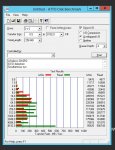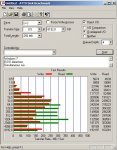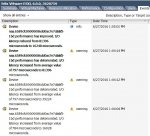Hi,
It's me again. This time I met the trouble with newest FreeNAS update: FreeNAS-9.10-STABLE-201606072003 (696eba7).
The system load is unsual high and python2.7 processes consume so much of RAM:
I found the ARC is very small too, normally it would take more than 6.5GB of RAM in total 8GB.
I really dont know how to fix this mess now :(
My system configuration:
VMWare main VMs volumes use iSCSI connection from FreeNAS VM (All-in-one box)
My current kernel tuning:
It's me again. This time I met the trouble with newest FreeNAS update: FreeNAS-9.10-STABLE-201606072003 (696eba7).
- I used to meet this bug previously (https://forums.freenas.org/index.php?threads/freenas-9-3-stable-upgrading-issue-from-9-2-1-9.25462/) and can not fix it completely despite of trying to change VMXNET3 adapter setting (disable TSO, change MTU.....).
- With some previous FreeNAS 9.10 updates I did not see the errors happened (maybe I did not stress test my system often now) but with this newest update, it is very easy to spot the error in the logs and replicate it. I have just fire update command on 02 Windows Server 2012 VMs then the error appears (what?!!? very moderate/light IO load)
I saw lot of message from ctl_datamove with address (0:3:0) and (0:4:0), are they specific drives in my 04 drives pool.Jun 25 00:31:13 freenas WARNING: 192.168.10.2 (iqn.1998-01.com.vmware:xxx): no ping reply (NOP-Out) after 5 seconds; dropping connection
....
Jun 25 00:33:33 freenas ctl_datamove: tag 0xebbd2f on (0:3:0) aborted
....
Jun 25 00:35:22 freenas ctl_datamove: tag 0xebcb78 on (0:3:0) aborted
....
Jun 25 00:49:51 freenas ctl_datamove: tag 0xbe9a1e on (0:4:0) aborted
Jun 25 00:49:51 freenas ctl_datamove: tag 0xbe9a23 on (0:4:0) aborted
Jun 25 00:49:51 freenas ctl_datamove: tag 0xbe9a24 on (0:4:0) aborted
Jun 25 00:49:51 freenas ctl_datamove: tag 0xbe9a2f on (0:4:0) aborted
Jun 25 00:49:51 freenas ctl_datamove: tag 0xbe9a32 on (0:4:0) aborted
Jun 25 00:49:51 freenas ctl_datamove: tag 0xbe9a33 on (0:4:0) aborted
Jun 25 00:49:51 freenas ctl_datamove: tag 0xbe9a01 on (0:4:0) aborted
....
Jun 25 16:38:00 freenas ctld[65755]: 192.168.10.2: read: Connection reset by peer
Jun 25 16:38:00 freenas ctld[1675]: child process 65755 terminated with exit status 1
The system load is unsual high and python2.7 processes consume so much of RAM:
last pid: 67242; load averages: 1.06, 1.14, 0.89 up 9+03:06:09 16:53:28
34 processes: 1 running, 33 sleeping
CPU: 1.0% user, 0.0% nice, 54.1% system, 0.0% interrupt, 44.9% idle
Mem: 193M Active, 3708M Inact, 3931M Wired, 21M Cache, 75M Free
ARC: 3171M Total, 1402M MFU, 1520M MRU, 2026K Anon, 169M Header, 78M Other
Swap: 8192M Total, 235M Used, 7957M Free, 2% Inuse
PID USERNAME THR PRI NICE SIZE RES STATE C TIME WCPU COMMAND
2886 root 12 20 0 231M 20220K nanslp 1 18:45 0.00% collectd
2062 root 2 20 0 66148K 6044K select 1 4:23 0.00% vmtoolsd
2610 root 1 52 0 217M 18516K select 1 3:51 0.00% python2.7
3831 root 2 20 0 111M 9512K select 1 2:00 0.00% python2.7
2638 root 6 20 0 370M 121M select 1 1:15 0.00% python2.7
1431 root 2 20 0 68924K 2816K kqread 1 1:04 0.00% syslog-ng
1143 root 1 20 0 3705M 3622M select 1 0:45 0.00% devd
1753 root 1 20 0 30260K 18104K select 1 0:20 0.00% ntpd
3463 root 1 20 0 51704K 2428K select 1 0:14 0.00% zfsd
2382 root 1 32 10 17064K 908K wait 1 0:02 0.00% sh
94451 www 1 20 0 34116K 2148K kqread 1 0:01 0.00% nginx
3473 root 1 20 0 20740K 660K nanslp 1 0:01 0.00% cron
3525 root 1 52 0 161M 5256K ttyin 0 0:00 0.00% python2.7
2977 root 4 52 0 169M 5596K usem 0 0:00 0.00% python2.7
2364 root 1 20 0 30724K 1256K nanslp 1 0:00 0.00% smartd
1675 root 1 20 0 25328K 2048K select 1 0:00 0.00% ctld
[root@freenas ~]# top | grep "python2.7"
2638 root 6 20 0 370M 122M select 1 1:21 0.78% python2.7
3831 root 2 20 0 111M 9532K select 0 2:00 0.49% python2.7
2610 root 1 52 0 217M 18516K select 0 3:51 0.10% python2.7
3525 root 1 52 0 161M 5256K ttyin 0 0:00 0.00% python2.7
2977 root 4 52 0 169M 5596K usem 0 0:00 0.00% python2.7
I found the ARC is very small too, normally it would take more than 6.5GB of RAM in total 8GB.
I really dont know how to fix this mess now :(
My system configuration:
- SuperMicro X10SL7-F
- 32GB ECC DDR3 (04 modules 8GB)
- Intel E3-1231v3
- 04 Intel 530 SSD
- 01 Toshiba 120GB SSD to keep essential VM volumes (FreeNAS + firewall)
- 01 USB flash to boot VMWare
VMWare main VMs volumes use iSCSI connection from FreeNAS VM (All-in-one box)
My current kernel tuning:
hw.pci.enable_msi = 1
hw.pci.enable_msix = 0 (prevent interrupt stomp bug)
kern.icl.coalesce = 0
vmxnet3_load = YES
Last edited:




